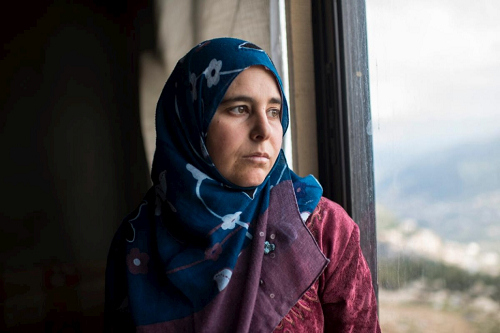As war enters 7th year, UNHCR warns Syria is ‘at a crossroads’
While there are some hopes for peace, the needs and suffering of millions of Syrians continue unabated; Syrian war is a ‘collective failure.’
As the world prepares to mark yet another tragic milestone in the brutal Syrian conflict, UNHCR, the UN Refugee Agency, urges the international community to redouble its generous support to help offset the continued, intense suffering of millions of innocent civilians in the country and the region.

Syrian refugee Nasreen Ahmed Sweii poses in Tripoli, in North Lebanon, in this March 2014 portrait. She fled her family home in Homs, Syria, with her four children after her husband was killed.
“Syria is at a crossroads,” said Filippo Grandi, United Nations High Commissioner for Refugees. “Unless drastic measures are taken to shore up peace and security for Syria, the situation will worsen.”
In Syria, 13.5 million need humanitarian aid; 6.3 million are displaced internally; hundreds of thousands have made perilous sea voyages seeking sanctuary; nearly 3 million Syrians under 5 have grown up knowing nothing but conflict; and 4.9 million – the majority women and children – are refugees in neighbouring states, placing host communities under huge strain as they shoulder the social, economic and political fallout. “Ultimately, Syria’s conflict isn’t about numbers – it’s about people,” Grandi added. “Families have been torn apart, innocent civilians killed, houses destroyed, businesses and livelihoods shattered. It’s a collective failure.”
This year and beyond, UNHCR will continue to provide aid and protection to the victims, in Syria and the region. UNHCR, with partners, has been providing life-saving help for millions. In 2016, over 1 million Syrians received winter assistance – essentials to help keep people alive in sub-zero temperatures. Last year, over 4 million people within Syria received basic relief items – like food, medicine, bedding and utensils. Over 2 million benefitted from UNHCR’s network of community centres in Syria, providing services including child protection, education and health. Within the region, over 3 million displaced Syrians and refugees received assistance to help survive a bitterly cold winter. UNHCR and partners have helped nearly five million Syrian refugees and those hosting them with a range of protection and assistance – including education, healthcare and shelter in the five major refugee hosting countries in the region.
As vulnerabilities increase over time, funding is, unfortunately, lagging behind needs. A conference in Brussels in early April will assess the country’s future, including humanitarian funding requirements. The UN is requesting $8 billion this year to meet Syrians’ needs at home and in exile. This follows important commitments made at the 2016 London Conference, especially on education and livelihoods, and it is essential that these efforts are sustained. “We urge donors to maintain adequate, flexible funding to allow us to respond to the enormous needs,” Grandi said. “Funding won’t end the suffering. But it is one thing we can do as poverty and misery intensify. The resources currently available simply don’t come close to meeting all the challenges.”
UNHCR hopes that the recent peace initiatives will pave the way to a lasting and sustainable resolution. “Peace talks alone won’t create the conditions on the ground for refugees to be able to return,” Grandi added. “But once the basic elements for durable peace and security are in place, we should anticipate the largest reconstruction effort in a generation. In the meantime, it’s essential that the lifeline provided by humanitarian aid is maintained, and humanitarian access expanded to enable life-saving support for all those in need.”
Source: United Nations High Commissioner for Refugees
- 223 reads
Human Rights
Ringing FOWPAL’s Peace Bell for the World:Nobel Peace Prize Laureates’ Visions and Actions

Protecting the World’s Cultural Diversity for a Sustainable Future

The Peace Bell Resonates at the 27th Eurasian Economic Summit

Declaration of World Day of the Power of Hope Endorsed by People in 158 Nations

Puppet Show I International Friendship Day 2020

